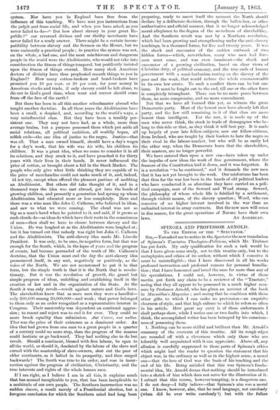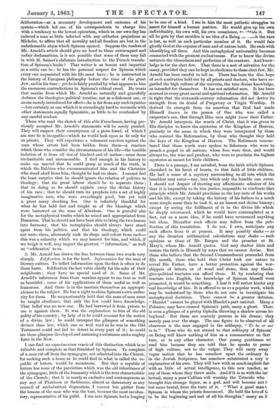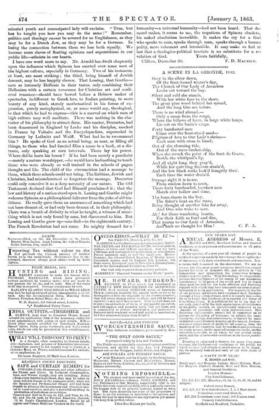SPINOZA AND PROFESSOR ARNOLD.
To THE EDITOR OF THE " SPECTATOR."
SIR,—You asked me to notice in the Spectatorthe new translation of Spinoza's Tractatus Theologico-Politicus, which Mr. Trtibner has put forth. My only qualification for such a task would be that I have given some study, not to this treatise only, but to the metaphysics and ethics of its author, without which I conceive it must be unintelligible ; that I have discovered in all his works profound instruction and profound reasons for personal humilia- tion; that I have honoured and loved the man far more than any of his speculations. I could not, however, in virtue of these merits, put forth any claim to be a reviewer of the " Tractate," seeing that they all appear to be possessed in a much higher mea- sure by Professor Arnold, who has given an account of the book in Macmillan's Magazine ; and seeing that he combines with them other gifts to which I can make no pretension—an exquisite clearness of style, and that high culture to which he refers so often in his article. How great my envy is of these endowments I shall perhaps show, while I notice one or two faults into which, I think, the accomplished writer has been betrayed by his conscious- ness of pcmeosing them.
1. Nothing can be more skilful and brilliant than Mr. Arnold's summary of the contents of this .treatise. All its rough edges are rounded off with a cleverness which only those who are tolerably well acquainted with it can appreciate. Above all, any allusion is carefully suppressed to those parts of Spinoza's ethics which might lead the reader to question the statement that his object was, in the ordinary as well as in the highest sense, a moral one—that the love of God was the basis of his teaching and the end of his life. Being satisfied that this was Spinoza's funda- mental idea, Mr. Arnold deems that nothing should be introduced into a sketch of him which does not serve for the illustration of it. I submit that this course, however tempting, is a dangerous one. I do not deny—I fully believe—that Spinoza's aim was a moral one. I know, however, also, that he used language, not carelessly (when did he ever write carelessly?) but with the fullest
deliberation—as a necessary development and outcome of his system—which led one of his correspondents to charge him with a tendency to the lowest epicurism, which in our own day has induced a man so little infected with any orthodox prejudices as Michelet, to affirm that all morality and all freedom are lost in the unfathomable abyss which Spinoza opened. Suppose the readers of Mr. Arnold's article should give no heed to these extravagant and unfair declamations, is it not possible that some of them may fall in with M. Saisset's elaborate introduction to the French transla- tion of Spinoza's books? That writer is as honest and impartial as a critic can be ; he has the personal respect for Spinoza which every one acquainted with his life must have ; he is instructed in the history of European philosophy before the time of the great Jew, and in his time ; yet he is fairly puzzled by what appears to him the enormous contradictions in Spinoza's ethical creed. He treats that maxim from which Mr. Arnold so naturally and gracefully deduces the theologico-political treatise, not as a dishonest one, or as one merely introduced for effect—he is far from any such injustice —but certainly as one which it is exceedingly hard to reconcile with other statements equally Spinozistic, as little to be overlooked by any careful student.
Those who read the sketch of this able Frenchman, having pre- viously accepted Mr. Arnold's statements will be sorely puzzled. They will suspect their countryman of a pious fraud, of which I am sure he is incapable--which he would look upon as fit only for us priests. They will experience a vehement reaction against the man whose errors had been hidden from them—a reaction which those who consider the circumstances of his life—the terrible isolation of it from all ties of Mildred and of nation—must deem uncharitable and unreasonable. I find enough in his history to make me marvel that he could grasp so much of the truth, in which the Rabbins who excommunicated him and the Christian who stood aloof from him, thought he had no share. I cannot feel the least surprise that he should ignore the relation of politics to theology ; that his great labour should be to separate them ; that in doing so he should explain away the divine history of his race ; that he should turn its prophets into a set of highly imaginative men, who were exceedingly good, but yet told a great many shocking lies. One is infinitely thankful for what he 'has held fast and taught us of the blessings which were bestowed on the sons of Abraham. One is grateful also for the metaphysical truths which he seized and appropriated from Descartes. That he should not have been able to bring the two lessons into harmony, that his metaphysics should always have stood apart from his politics, and that his theology, which could not unite them, alternately took its shape and colour from each— this was a calamity which we may lament for him, and which, if we weigh it well, may impart the greatest "information," as well as "edification' to us.
2. Mr. Arnold has drawn the line between these two words very sharply. Edification is for the herd. Information for the men of literary culture. To inflict information upon the first is often to do -them harm. Edification the last value chiefly for the sake of their neighbours ; they have no special need of it. Some of Mr. Arnold's inferences from these maxims appear to me true as well as beautiful ; some of his applications of them useful as well as humorous. And there is in the maxims themselves an appropri- ateness to the subject. He has a right to claim Spinoza's own autho- rity for them. He unquestionably held that the mass of men must be taught obedience, that only the few could have knowledge. That belief was no new one. He had borrowed it from priests to use it against them. It was the explanation to him of the old polity of his country ; by help of it he could account for the notion of a divine law ; he could interpret the glimpses of something diviner than law, which one so well read as he was in the Old Testament could not fail to detect in every part of it ; he could see these glimpses developed and assuming a substance and a mighty force in the New.
I can find no experimentum crucis of this distinction which is so valuable and complete as that furnished by Spinoza. To complain of a man cut off from the synagogue, not admitted into the Church, for seeking such a home as he could find in what is called the re- public of letters, would be monstrous. But that a republic of letters has none of the patriotism which was the old inheritance of the synagogue, little of the humanity which is the true characteristic of the Church ; that it is nearly as exclusive and contemptuous as any sect of Pharisees or Sadducee,s, almost as damnatory as any council of ecclesiastical dogmatists, I cannot but gather from the lessons of the man who was the best, because the most involun- tary, representative of his guild. I am sure Spinoza had a longing
to be one of a kind. I see in him the most pathetic struggles to assert for himself a human position. He would give up his own individuality, his own will, his own conscience, ta ^htain it. But
all he gets by that sacrifice is an idea of a Being — the race is lost, as well as each particular member of it. He would fain glorify God at the expense of man and of nature both. He ends with identifying all three. And this metaphysical universality becomes connected with the greatest exclusiveness. For to know the divine nature is the blessedness and perfection of the creature. And know- ledge is for the elect few. That there is a sort of salvation for the many, provided they can be kept in obedience to these elect few, Mr. Arnold has been careful to tell us. There has been the dim hope of such a salvation held out by all priests and doctors, who have re- garded the high culture of the universe, the true divine knowledge, as intended for themselves. It has not satisfied men. It has been scorned in every great moral and spiritual reformation. Mr. Arnold is right that the sixteenth-century reformation did not derive its strength from its denial of Purgatory or Virgin Worship. It derived its strength from its assertion that God had made Himself known in the person of One who was called a carpenter's son, that through Him men might know their Father. Mr. Arnold interprets the words of Christ, that it was given to His disciples to know the mysteries of the Kingdom of Heaven, precisely in the sense in which they were interpreted by those who resisted the Reformation, by those who thought they held the keys of the Kingdom of Heaven. The Reformers remem- bered that those words were spoken to fishermen who were to preach a gospel to all nations, whose foes were then, and would always be, the wise and prudent, who were to proclaim the highest mysteries as meant for little children.
There is a passage, I am satisfied, from the faith which Spinoza cherished in his heart of hearts, to that faith of little children. He had a sense of a mystery surrounding us all into which the humblest may enter—nay, into which only the humble can enter. I should not despair of showing any affectionate admirer of his that it is impossible to do him justice, impossible to vindicatethat principle which Mr. Arnold proclaims as the key-note of his works and his life, except by taking the history of his fathers in a much • more simple sense than he took it, as an honest and divine history; except by seeing the fulfilment of it in the divine life which he deeply reverenced, which he would have contemplated aa fact, not as a mere idea, if he could have reverenced anything but ideas. Hereafter such effects may follow from the pub- lication of this translation. I do not, I own, anticipate any such effects from it at present. It may possibly shake — as any the dreariest arithmetical calculations may shake — such opinions as those of Mr. Burgon and the preacher at St. Mary's, whom Mr. Arnold quotes. God may shatter idols and restore the faith in Himself by ways that we cannot devise. But those who believe that the Second Commandment proceeded from His mouth, those who hold that Christ took our nature to reveal His Father, have a better protection against the wor- shippers of letters, or of wood and stone, than any theolo- gico-political tractates can afford them. If, by rendering that tractate into English, the knowledge of Spinoza himself were promoted, it would be something. I fear it will rather hinder any real knowledge of him. It is offered to us ai a popular work, which may be understood by those who do not care to investigate his metaphysical doctrines. There cannot be a greater delusion. " Hamlet " cannot be played with Hamlet's part omitted Many a Polonius may have crossed Spinoza's path, many a ghost. There is even a glimpse of a pretty Ophelia throwing a shadow across hie boyhood. But these are scarcely persons in his drama; they merely pass over the stage. The one figure to be observed of all observers is the man engaged in the soliloquy, "To be or not to be." Those who do not attend to that soliloquy of Spinoza' on Being will know nothing of him as a commentator on Sen- tare, or in any other character. Our young gentlemen wi read him because they are told that he speaks to perm of high culture, not to the vulgar. They will carry away vague notion that he has somehow upset the ordinary fa
in the Jewish Scriptures, has somehow substituted a very w explanation of his own. They will bow with as much implicit fait with as little of actual intelligence, to this new teacher, as any of those whom they threw aside. And if it is so with the int lectual, many a poor Caliban will worship the Trinculo who brought him strange liquor, as a god, and will become not but more brutal, from the taste of it. "What a good man t Spinoza is whom the priests denounced. He held the love of 6
to be the beginning and end of all his thoughts," many an ii minatel youth and emancipated lady will exclaim. "True, but has he taught you how you may do the same :" Remember, politics and theology cannot be severed for us Englishmen, as they may be for a Dutch Jew, as they may be for a German. In losing the connection between them we lose both equally. We become mere slaves of floating opinions and superstitions in our public life—atheists in our hearts.
I have one word more to say. Mr. Arnold has dwelt eloquently upon the influence which Spinoza has exerted over some men of the highest culture, especially in Germany. Two of his instances, at least, are most striking ; the third, being himself of Jewish descent, may be less happily chosen. That Leasing, that Goethe- -menso intensely Hellenic in their tastes, only combining their Hellenism with a certain reverence for Christian art and niedi- mval romance—should have bowed before a Hebrew maker of spectacles, indifferent to Greek lore, to Italian painting, to mere beauty of any kind, sternly mathematical in his forms of ex- pression, purely metaphysical, or, as some would, say, theological, in that which he bail to express—this is a marvel on which men of high culture may well meditate. There was nothing in the cha- racter of his philosophy to attract them. His master, Descartes, had been denounced in England by Locke and his disciples, mocked in France by Voltaire and the Encyclopedists, superseded in Germany by Leibnitz and Wolff. What had he to recommend him ? He spoke of God as an actual being, as near, as filling all things, to those who had fancied urn a name in a book, at a dis- tance, only speaking at rare intervals. There lay his power. Where did he learn his lesson? If he had been merely a pantheist —merely a nature worshipper, —he wculd have hadnothing to teach those who were already so well trained in the schools of pagan thought and life. The child of the circumcision had a message to them, which these schools could not bring. The Robbins, Jewish and Christian, had misunderstood or forgotten the message. Descartes could only conceive it as a deep necessity of our nature. The Old Testament declared that God had Himself proclaimed it ; that the law and history of a nation stood upon it. Leasing and Goethe might welcome Spinoza as a philosophical deliverer from the yoke of old tra- ditions. He really gave them an assurance of something which had not been dreamt of, or had only been dreamt of, in their philosophy. There was a breath of divinity in what he taught, a witness of some- thing which is not only found by man, but discovered to him. But Leasing and Goethe grew up—one died—in the eighteenth century. The French Revolution had not come. Its mighty demand for a
humanity—a universal humanity—had not been heard. That de- mand makes, it seems to me, the negations of Spinoza obsolete, his naked absolutism incredible. It makes the cry for a God who speaks to man, speaks through man, speaks through a human polity, more vehement and irresistible. It may make us feel at last that a theologico-political tractate is no substitute for a re- velation of God. Yours faithfully,






























































 Previous page
Previous page